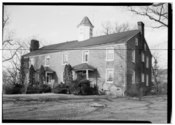Presidential libraries outside NARA
Locations of the
NARA-administered (red) and other (blue) U.S. presidential libraries
The presidential library system is made up of thirteen presidential libraries operated fully, or partially, by NARA. [n 1] [4] Libraries and museums have been established for earlier presidents, but they are not part of the NARA presidential library system, and are operated by private foundations, historical societies, or state governments, including the James K. Polk, William McKinley, Rutherford B. Hayes, Calvin Coolidge, Abraham Lincoln and Woodrow Wilson libraries. For example, the Abraham Lincoln Presidential Library and Museum is owned and operated by the state of Illinois.
The Richard Nixon Library and Birthplace was not originally part of the presidential library system. While the Nixon Presidential Materials Staff, which administers the Nixon presidential materials under the terms of the Presidential Recordings and Materials Preservation Act, is part of NARA, the private nonprofit Richard Nixon Foundation owned and operated the Richard Nixon Library & Birthplace. In January 2004, Congress passed legislation that provided for the establishment of a federally operated Richard Nixon Presidential Library in Yorba Linda, California. In March 2005, the Archivist of the United States and John Taylor, the director of the Richard Nixon Library & Birthplace Foundation, exchanged letters on the requirements to allow the Nixon Library to become the twelfth federally funded presidential library operated by NARA by 2007, while the Nixon Foundation would continue to own the campus and operate the Nixon Library complex with NARA. [4] On October 16, 2006, Timothy Naftali began his tenure as the first federal director of the Richard Nixon Library and Birthplace, and in the winter of 2006 NARA began to transfer the 30,000 presidential gifts from the Nixon Presidential Materials Staff in College Park, Maryland, to the Yorba Linda facility. [5] [6] On July 11, 2007, NARA began its operations at the Nixon Library site and the facility's name was changed to Richard Nixon Presidential Library and Museum. [7]
In May 2012, on the fiftieth anniversary of the founding of the Ulysses S. Grant Foundation, it selected Mississippi State University as the permanent location for Ulysses S. Grant's presidential library. [8] Historian John Simon edited Grant's letters into a 32-volume scholarly edition published by Southern Illinois University Press. [9]
On April 30, 2013, both chambers of the North Dakota Legislative Assembly passed a bill appropriating $12 million to Dickinson State University to award a grant to the Theodore Roosevelt Center for construction of a building to be named the Theodore Roosevelt Presidential Library. To access these funds, the Theodore Roosevelt Center must first raise $3 million from non-state sources. [10] Dickinson State University is also home to the Theodore Roosevelt Digital Library which has formed partnerships with the Library of Congress and Harvard University, among other institutions. They currently have over 25,000 items online.
On April 12, 2016, Harding 2020, a collaboration between the Harding Home, Ohio History Connection, and Marion Technical College, detailed plans to spend $7.3 million to establish the Warren G. Harding Presidential Center. Plans include restoring the Harding Home, Warren G. Harding's historic home in Marion, Ohio, and its grounds to its 1920 appearance. A 15,000-square-foot presidential center and museum was built adjacent to the house. Harding's presidential papers were moved from its previous location at the Ohio History Connection's headquarters in Columbus, Ohio, to the new center. The culmination of the work, was scheduled to be completed by the spring of 2020, to coincide with the 100th anniversary of Harding's election to the presidency. [11] The library was scheduled to open initially on May 23, 2020, with a formal dedication ceremony on Friday, July 17, 2020. This was then delayed until September due largely to back orders on construction materials and other issues. Then, the COVID-19 pandemic delayed the opening of the museum until May 12, 2021 [12]
In May 2017, it was announced that the Barack Obama Presidential Center, the planned location of the presidential library of Barack Obama, would not be part of the NARA system, making Obama the first president since Calvin Coolidge not to have a federally owned facility. [13] Instead, in a "new model" the nonprofit Obama Foundation will partner with the NARA on digitization and making documents available. [14] It was announced that the City of Chicago would own the center. [15] [16]








































